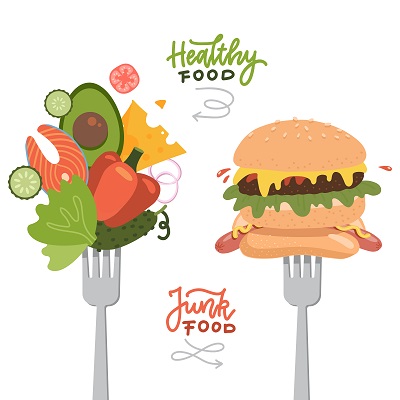 Well, the answer to that question is a resounding “YES!” Everyone knows that and everyone agrees. Ask anybody on the street that question and they are likely to tell you that, yes, junk food is really bad for one’s health.
Well, the answer to that question is a resounding “YES!” Everyone knows that and everyone agrees. Ask anybody on the street that question and they are likely to tell you that, yes, junk food is really bad for one’s health.
The problem, however is that people have different ideas and concepts of what “junk” food is. People tend to think of hotdogs as food, not as junk food.
So, what exactly is “junk” food and why is it really bad for your health?
Well, literally, something is called “junk” when it has little or no value. It is only fit to be thrown out. The same idea is used in the term “junk” food – it is food that has little or no nutritional value.
It is something edible, something you can eat, but it has little or no nutrition. In fact, “junk” food contains a lot of things that are bad for you such as sugar, fat and calories.
Junk food is usually pre-processed – It comes in packages and requires little or no cooking. You can eat it straight out of the packaging. If you have to open a plastic or foil package to eat a particular kind of food, it is junk food because it has been processed and preserved so that it will retain its taste but not its nutritional value.
- You can see from this definition that store-bought crackers, biscuits, cookies and ready-to-eat snacks are junk food.
- Canned soup, frozen dinners and microwave re-heatable food are junk food.
- Processed meat products such as ham, bacon, hotdogs and sausages, chicken nuggets, and fish sticks are also junk food.
- Even breakfast cereal can be considered junk food.
What makes them junk?
Well, they have lost their nutritional content because of processing. These food items had fresh ingredients once, but, those ingredients were washed, peeled, sliced and boiled that the vitamins and minerals they once contained have all been removed by the processing the food has undergone.
The food is no longer “fresh” meaning, it has been preserved through a cooking process or through pasteurization, or, it has additives that preserves its shelf life. The preservatives are usually in the form of salt and citric acid.
These food additives and preservatives keep the food looking colorful and its taste the same as the day it was packaged even if you are eating it four years after it has been packaged.
These food additives usually accumulate in our tissues and in our organs. Since we have only began pre-packaging food and consuming them regularly, the effects on humans have not yet been fully explored. It has been established, however, that in the long term too much salt contributes to the development of hypertension.
Too much sugar contributes to the development of diabetes. Too much cholesterol contributes to the hardening of the arteries in the heart which causes heart attacks.
Obesity and Junk Food
Because we eat a lot of junk food these days, the rate of obesity has also risen. Obesity predisposes people to develop the top three leading diseases that kill people in the world today: heart disease, diabetes and cancer.
Cancer and Junk Food
Studies have shown that cancer cells are present even in healthy people. Cancer is not usually detected until the cancer cells have multiplied so fast at one particular site that it causes symptoms.
People with healthy immune systems can usually fight off the cancer cells before they multiply exponentially. However, when people eat a lot of junk food, they fill their bellies but they starve their tissues and organs of the necessary vitamins and minerals that are needed to maintain the efficiency of the immune system.
Thus, cancer is now regarded as a disease caused by severe malnutrition at the cellular level. Healthy cells are so starved of vital nutrition that the cells can no longer defend themselves successfully against invading cancer cells.
We eat a lot. We feel full. But the food we eat is so poor in quality because it does not contain the vitamins, minerals and other necessary nutrients to keep our bodies healthy.
This is the main reason why “junk” food is really bad for our health. It tickles our taste buds and keeps us feeling full but it does not give us what we need to thrive.






